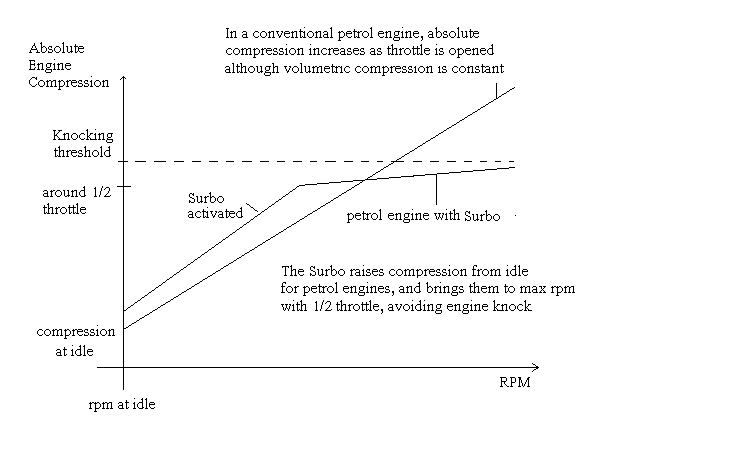

















1. When too low an octane is used. Normally, petrol with octane number (RON) that is too low can't be used in high compression engines, because the petrol under pressure can ignite itself prematurely.
2. When some fuel additives are used. These may make the fuel too easy to burn and so knocking occurs, audibly as a "clack clack" sound.
3. When too high a gear is used and the engine cannot turn fast enough, and the accelerator depressed too much in an effort to move the vehicle. As a result, the fuel that is injected is excessive and can cause knocking. For example, in second gear at a low rpm, it is often difficult or even impossible to shift down to first gear, acceleration is poor and overfueling and knocking can occur easily.
4. Whenever the accelerator is pressed too much, suddenly.
For 1. We recommend using a Surbo. If so, you can use petrol with a lower octane than recommended by the car manufacturer, because the accelerator is often pressed less, resulting in less fuel injected, so the chance of knocking is reduced.
For 2. If you use a Surbo, this may be less likely, because the accelerator will not have to be pressed as much for the same acceleration. If the purpose of using the additive is to save fuel, then it may not be required as the Surbo saves at least 10% fuel.
For 3. If a Surbo is used, the air intake pressure is raised, and low rpm torque significantly increased, so the tendency for knocking is reduced. For automatic tranmissions, in such instances the gearbox is more able to kick down to first gear with slightly added pressure on the accelerator, which sends more of the Surbo's pressured air into the engine, allowing for higher rpm required for a lower gear.
For 4. With a Surbo, the driver may never have to floor the accelerator, because the Surbo sends the engine to its rpm limit with just 1/2 accelerator pressure. The engine with Surbo does not have to work as hard as before, as it is aided by the air pressure from the Surbo. The increased torque means that the accelerator does not have to be pressed as much as before, so the fuel injected and heat created in the engine is less, and the likelihood of engine knocking is reduced.
Case study: Chevrolet Captiva 2.4

Having installed the Surbo, the owner of the above car immediately noticed that the knocking noise during acceleration was no more. It is possible that for more power, car manufacturers are increasing engine compression to the limit. Vehicles have also become heavier due to added equipment and the load causes the engine to work harder and so the chance of knocking goes up.
A Nissan Latio 1.5 CVT came with an extra hot engine. The owner confirmed that there were knocking noises when he accelerated. After the Surbo was installed, he noted that the knocking noises were gone. The accelerator felt lighter, and he was actually pressing less so the tendency for over-fueling, and therefore knocking, had decreased. Through a corner, he said that the power did not slump as before (reason being that the Surbo charges air when the accelerator is held still). The gearbox would also find a lower ratio more readily when he accelerated while cruising.

Watch the video above showing how an engine revs with Surbo. Or watch it with the How it works page.
Above: video of Volvo XC90 T8 with Surbo, sprinting to 130 kph.
Above: video of Volvo XC90 T8 with Surbo, sprinting to 211 kph.
Above: video of Volvo XC90 T8 with Surbo, sprinting to 224 kph.

More torque and BHP (dyno test)
Quick revving (1/2 throttle to RPM limit)
If you are using a handphone to read this, you can press the above CHAT link to either call us, or to save our number to your contacts, and then you can message us by clicking the WhatsApp icon below.